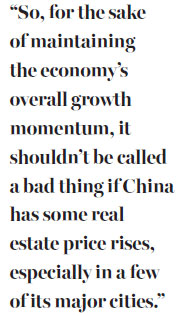More expensive housing is price of change
Updated: 2016-09-23 07:59
By Ed Zhang(China Daily Europe)
|
|||||||||
Once an economy has basically achieved takeoff, real estate development becomes the most important force to drive growth
For the past few weeks, news about China's macroeconomic state has continued to be dominated by the urban housing market.
Technically, this is good news - meaning that the country's inventory of unsold apartments, a main cause of the economy's low efficiency and debt buildup, has become less of a problem. People are lining up for housing units in the largest cities - Beijing, Shanghai, Shenzhen, Nanjing and Hangzhou - pushing average prices to a historic high.
Last month, of the 70 largest cities on the Chinese mainland, only in six did housing prices go down or stay the same. The other 64 reported a price increase from the same period last year, with Shanghai reporting the highest level of 5.6 percent.

Meanwhile, secondhand homes witnessed price rises in 57 cities, with Beijing reporting 3.9 percent year-on-year; Hangzhou, 2.8 percent; and Zhengzhou, 4.5 percent.
In Beijing and Shanghai, the average house price has been close to 50,000 yuan ($7,500; 6,700 euros) per square meter. Of all the provincial capitals, Nanjing, in Jiangsu province, has exceeded 20,000 yuan.
People won't be happy when prices go up so rapidly. Both those who do and those who don't have the courage to buy new apartments are worried, not knowing whether the market is sustainable (with the astonishing rate of the price rise, many say it isn't) and which part of it will fall into a slump.
There are people asking how can a powerful government let the housing market crash in its capital city without intervening? This is only a hypothetical argument, however.
Officials and economists are not helping either. For the past few years, they have been unable to give plausible advice on how long, and how high, housing prices will continue to rise in key cities. For a country that still sees itself as a developing one, how can housing prices in some of its cities be higher than most parts of the United States, even nearly catching up with the level of Hong Kong?
This is not a question that people can comfortably live with. Without knowing how much higher Beijing and Shanghai's housing prices can go, and what the possible solution will be, how can anyone possibly calculate, if anything goes wrong, how much value investors can retain? Or how they can claim to understand the Chinese economy?
In fact, in all countries, once the economy has basically achieved takeoff, or has built some industry to attract an increasing population to the cities, real estate development becomes the single most important force to drive the growth of the whole economy.

Where demand for real estate development dwindles, economic growth (and growth potential) tends to be weak in general.
So, for the sake of maintaining the economy's overall growth momentum, it shouldn't be called a bad thing if China has some real estate price rises, especially in a few of its major cities.
China's malaise is the fact that house prices rise too much and too quickly in just a small number of key cities. But if all those increases did not exist, the country's economic situation would be more disastrous than ever.
Second, when people talk about China's real estate bubble, they should know that a considerable amount of the nation's housing investment has already been wiped out. Unfortunately, it is rural people, including the millions of migrant workers, who have made the sacrifice. The new homes they built in their villages are being wasted because many migrant workers are choosing to settle in the cities where they work.
For the past decade, their total investment in private home building has been at least 2 trillion yuan. Little added value can be recovered by homeowners from such huge investment.
The underutilization of so many rural homes has contributed indirectly to a balance between supply and demand in the overall housing market.
Most small cities in interior regions will also have problems sustaining local housing prices, especially those reporting a net loss in the working-age population.
Third, the present internal migration pattern is unlikely to change for the next 50 years. Increasingly, young and capable workers will move to and concentrate in the coastal major cities and nearby satellites.
If housing prices get prohibitively high in those urban centers, the government can do many things to help their residents - more easily than helping residents of all the villages in the country - in the form of subsidized public services and diverse choices.
In the process, there is little doubt that housing prices in Beijing, Shanghai and Shenzhen will one day rise to a level comparable to Hong Kong. Only the competition among their satellite and nearby towns can help China's young workers find more-affordable apartments.
The author is an editor-at-large of China Daily. Contact the writer at edzhang@chinadaily.com.cn
(China Daily European Weekly 09/23/2016 page10)
Today's Top News
State of emergency declared in US city amid protests
Universities given boost in rankings
Demand for Mandarin rises in UK
China 'capable of keeping medium-to-high growth'
Li tells Obama of opposition to THAAD deployment
Greek vows to improve refugee situation on island
UN suspends aid convoys following deadly strikes
New York bombing suspect captured in New Jersey
Hot Topics
Lunar probe , China growth forecasts, Emission rules get tougher, China seen through 'colored lens', International board,
Editor's Picks

|

|

|

|

|

|







